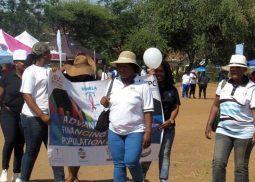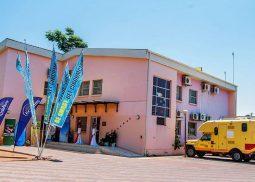1. Kazungula Bridge Project

The specific goal of the intervention is to minimize the risk associated with high risk construction worker populations – targeting construction workers and population in affected communities with intensified prevention interventions anchored in a sustained HIV/AIDS and other ailments testing by experienced Tebelopele service providers.
Objective 1: Undertake Workplace Assessments
Objective 1: Undertake Workplace Assessments
Working with Construction Management, TVCT will assist to assess employee health needs, knowledge level and device target specific evidence informed interventions.
Objective 2: Provide intensified Prevention Education
To reach people with integrated prevention messages as individuals, couples or groups at various social networking sites e.g. bars, sheebens, workplaces etc. Condom demonstration and distribution will also be done. Employees will be sensitized on gender, disability, the importance and benefits of employee wellness as well as the various perspectives of wellness.
Objective 3: Provide high quality voluntary HIV counseling and testing
Tebelopele will provide high quality, VCT services with same-day results to individuals, couples, adolescents and children in the affected communities and contractors, coupled with ongoing HIV/AIDS support. Data on the impact of the program will be collected and in combination with testing data they will be analyzed to facilitate offering of feedback on its effectiveness to Construction Management and the Department of Roads.
Objective 4: Undertake effective referral linkages
- Tebelopele refers clients and offers supportive counseling as part of a palliative care package to provide supportive counseling for clients that test positive, but are ineligible for ART’s as well as negative clients to remain negative.
- Recognizing that STI treatment is critical to HIV and STI efforts, Tebelopele will partner with the DMSAC to identify government health workers to accompany the Tebelopele teams and provide STI screening according to national syndrome treatment guidelines.
- Strengthening of referral networks to Ante Retroviral Therapy (ART), Safe Male Circumcision (S.M.C), Prevention of Mother to Child Transmission (PMTCT), and social services will ensure that all clients tested continue to pursue specific care services to increase the quality of their well-being and futures.
- For the ongoing support of those who have tested, Tebelopele will establish facilitated Post Test Wellness Clubs for construction workers and their partners.
Objective 5: Provide lifestyle illnesses package
Over and above HIV counseling and testing, employees will be screened for lifestyle disease such as diabetes, hypertension, cholesterol, nutritional assessment as well as counseling and follow-up on those.
Objective 6: Organize family wellness days
TVCT will help arrange for wellness services to the whole family where fun activities will be combined with education and access to various services.
Objective 7: Undertake impact Assessment
A survey will be pre and towards the close of the project. This will be conducted to determine how much difference employed interventions had made. The survey report will be shared with the contracting company and the Ministry of Transport and Communications.
2. Dikgatlhong Project
The project titled “Provision of HIV/AIDS education, Counseling and Testing Services for Dikgatlhong Dam Construction Project was awarded to Tebelopele Voluntary Counseling and Testing by Department of Water Affairs and EHES (PTY) Ltd and commenced in March 2008. Tebelopele was to provide education, counseling and testing services for HIV/AIDS and other STIs at the Dikgatlhong Dam construction catchment area that covered the villages of Robelela, Matopi, Matsiloje, Patayamatebele and Mmadinare. The villages of Matopi, Patayamatebele and Matsiloje are in the North East District and are part of the Dikgatlhong project catchment area. The North East District HIV prevalence stood at 21.8 %( BAIS III, 2008). The villages of Mmadinare and Robelela are in the Bobirwa District with HIV prevalence of 18.9%. Considering that North East and Bobirwa both had high prevalence rate of HIV, prevention interventions were given priority to set objectives to protect the population of this catchment area. One of the project assumptions would be that residents of these villages could migrate to the Dam construction site where they would be exposed to risk of HIV infection due to economic activity at the site.
Program Goal and Specific Objectives
The specific Goal of the Project was to minimize the risk associated with high risk construction worker populations, targeting the estimated 19415 people in affected communities and construction workers, with prevention interventions, based on an initial community health profile, anchoring intensified HIV/AIDS testing by experienced Tebelopele counselors.
Objectives
This mode of VCT service delivery has been seen as a way to reach out to segments of the population that do not readily access health facilities, especially young people and men. It is also worth noting that the same quality service delivery standards at the freestanding Centres are upheld during the outreach activities.
- To conduct a Pre-intervention Community Health Profiling Survey
- To provide HIV Prevention Intervention package,
- To provide High-quality VCT to a population of 19415 of Dikgatlhong,
- To assess Post-intervention Community Health Profile.
The services were provided over a 54 months period reported on quarterly basis.
- Conduril
- Multiple Concurrent Partnerships
HIV and AIDS Prevention Project for Multiple Concurrent Partnerships and Intergenerational Sex in Goodhope, Kweneng East, South East, Francistown and Selibe Phikwe Districts
Project Goal
The Goal of this project is to increase the number of persons within the sexually active population (especially 15- 24yrs) who adopt key HIV prevention behaviors in Botswana by 2012. This goal was adopted and adapted from the National Strategic Framework II of which more needs to be done to realize the impact of the interventions.
Strategic Objectives
In order to achieve the above mentioned goal, several objectives had to be derived and activities to accomplish the objectives.
Strategic Objective 1 & 2: Reach men and youth with MCP prevention messaging encompassing implications of inter-generational relations by March 2012
Strategic Objective 3: Reach 10 communities with MCP prevention messaging through Adult-Child Relationship Modeling Communication (ACRMC) workshops
Strategic Objective 4: Enhancing MCP communication channels.
Methodology
This project will be implemented through Tebelopele centers in Francistown, Selibe-Phikwe, Lobatse (Goodhope & South East), Gaborone (South East) and Molepolole (Kweneng East). While focus will be on the main centers, in order to maximize the impact of the project and in view of the 1 year timeline, a number of activities targeting individuals, groups and community dynamics will be undertaken across the districts. The project will use strategies focusing on youth, men and communities.
The Youth Approach
The strategy is aimed at teaching youth to understand their sexuality, relationships and to enhance communication. This would be done through individual and group chats administered by peer counselors. Tebelopele has a Peer Counselling Programme which is run in schools and in the communities using Volunteers. The chat sessions are done using protocols done by Tebelopele and use intake sheets to enter data which is then entered into our data system for cleaning and analysis. A community based, youth driven approach such as using Volunteering Peer Counselors is sustainable and realistic
The Youth Peer Counselors in the communities will do house to house mobilization for youth (through partnerships with TCM) and set up appointments for group sessions within their communities. The group sessions could be in the form of chill sessions, afternoon braais or picnics. Furthermore debate sessions could be initiated between youth from different communities such that others could learn from the other communities. Debates sessions could also work in schools which can reinforce even the community ones.
Furthermore, more campaigns for in school youth should be done in order to provide them with a lot of information such that when they get into communities, after finishing school, they will be able to practice positive behaviors that would prevent them from having multiple partners and not getting infected with HIV.
The Men’s Approach
Tebelopele will also utilize its men focused program that advocates for counseling and testing amongst men, to promote the MCP strategy. A strong Zebras4Life brand and network has already been established with the support of national team football players (Zebras). The national network comprises of male volunteers from community sports clubs who have been trained as peer educators and work to maintain post-test clubs for mobilization, education and linking supporters to posttest services. In addition to advocating for testing, the brand and established network of peer educators can be used to reach men with prevention messaging, ideal for addressing MCP. This approach will leverage on the already existing capacity of 120 peer educators in Nata, Francistown, Kasane and Ghanzi and hence the project will have a knock on effect at national level and not just the focus areas. Materials would also be developed that incorporate MCP education into the chat tools (teaching aids and take home material).
The focus on men is critical as they are key in MCP because the power to negotiate safer sex practices still lies largely in the hands of men. The Zebras4Life clubs and peer educators are an ideal vehicle to address the MCP because they can use their influence as leaders in their community sports clubs, as well as sports role models to reach out to majority of men. The clubs allow for open discussions, exchange of correct and reliable information as well as provide a support structured environment that can be used to address the drivers of MCP.
The use of the male program provides a strategic advantage as it takes advantage of existing structures and activities and a rather wide network of trained community volunteers which will significantly contribute to the sustainability of the project.
The Communities Approach
The approach is meant to create a conducive environment in the society that can reinforce the behavior change process being undertaken by individuals. It is believed that most of the behaviors are mostly controlled by what the community feels is appropriate and what is not and whether it is an acceptable behavior. According to the NSF II, active involvement of communities in the fight against HIV and AIDS is one of the principles that guide and shape both the planning and the action for HIV and AIDS. The approach will also create a platform for people to openly discuss issues on MCP and intergenerational relations and allow for debates and dialogue.
We are all the times available to help you. Do not hesitate to contact us.






